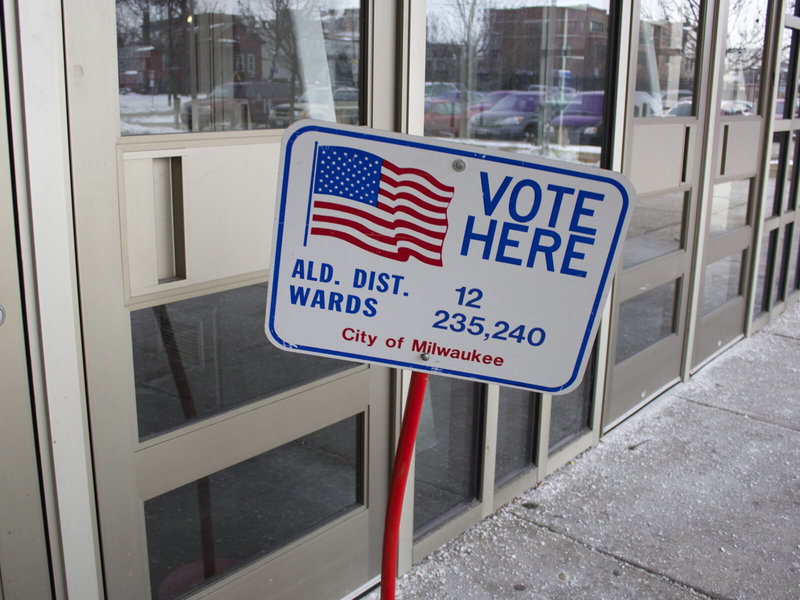Bemoaning low voter turnout is in season, but maybe this season’s plague of unused ballots might be the fault of the candidates.
Titillating isn’t the first word that comes to mind when folks who actually pay attention to all things politic comment on a state Supreme Court race. And that pretty much holds true with the April 3 contest between Madison attorney Linda Clifford and Washington County Judge Annette Ziegler.
People whose political astuteness comes from the tube, likely know that Ziegler has ethical lapses and that Clifford doesn’t look good in black and white while wolves howl in the background. It is a multi-million-dollar contest between conservatives and liberals, but how those ideologies would play out on the court is not something we’re hearing from the candidates.
Sure, whiffs of the school choice issue popped into the debate last week but neither candidate is developing a compelling case why voters should put them in the high court for the next ten years. So far there aren’t any nuances for the voters to ponder.
We know the Ziegler camp is touting her qualifications for office on the fact that she’s a judge in a suburban Milwaukee county. But she has also shown a somewhat devil-may-care regard for the rules of the bench. Last we heard, “gut check” isn’t in the judicial ethics code. From the hometown bank to Wal-Mart, the judge failed to disclose she owned and got loans from parties that were appearing in front of her bench.
Then, when Ziegler’s office phone records were released without phone numbers, Ziegler hid behind a department bureaucrat for making the decision, instead of offering full disclosure. It appears there may be some personal long-distance dialing by Ziegler (which is against county rules) totaling all of $10.
But the Clifford campaign continues to focus on Ziegler’s ethical lapses and not what a court would look like with her on it. In terms of rallying liberals (if that can ever be done), they’re still waiting for the pitch to cross the plate.
And the gotcha focus of the media doesn’t seem to help.
The two want to replace Jon Wilcox, one of the court’s most conservative stalwarts. Wilcox had his own bout of ethical lapses when he ran 10 years ago. His campaign was accused of illegally collaborating with conservative special interest groups, who spent more than $200,000 on his behalf –a big time no-no. He paid $10,000 to help settle the case, his campaign manager paid $15,000 and their co-conspirator paid $30,000-plus.
* * *
Milwaukee ballot highlights are School Board races for a majority of seats. It’s liberals versus conservatives here, too, mainly because every union-endorsed candidate is labeled liberal by the media and the non-union candidate is usually sucking off the teat of school voucher and privatization interests.
It’s interesting to note that a recent Journal Sentinel endorsement of board incumbents and retreads boasted that they would be the ones to speed up reform. One of their chosen, Jeff Spence, is running for a third term against a weak candidate. If the Journal’s idea of speedy reform is from someone who’s been in office for eight years and has yet to achieve the illusive reform, they must think the ice age happened over night.
In the race for the citywide School Board seat, Bama Brown-Grice, a Milwaukee Public Schools paraprofessional, is running against Bruce Thompson, a professor at MSOE. Thompson was one of the notorious leaders of the privatization and pro-voucher movement of the board in the late 1990s, but was ousted in 2001 while board president. Perhaps time has vanquished that perception.
Thompson’s latest advertising approach stresses that he’s against guns and violence in schools, as if his opponent is not. But Brown–Grice is not running what could be termed a stellar campaign. Fundraisers were cancelled without notice and campaign literature sent out with no mention of how to contact the candidate are just some of the gaffes testing her supporters. Hers is a campaign that will demonstrate if the teachers’ union can be taken seriously.
The likeliest chance of an incumbent board member losing is in Bay View, where Terry Falk is running for the second time against Joe Dannecker. Falk won a three-way primary against the current School Board president.
The occasional oddball small-town race and school spending referendums are more bait to get voters to the polls. The race for mayor of Cudahy is turning a drive in that burg into a continuous barrage of lawn signs. And voters in Menomonee Falls can recall those halcyon days when the Stars and Bars flew freely while looking at the name of one Jefferson Davis on their ballot–for president. But no betting man is taking odds that the dismal single-digit percentage of voter turnout in the February primary would be toppled by an overwhelming show of bodies this time around.
Candid Cameras: This could bring a whole new reason for the Summerfest smile. In the name of Homeland Security the Summerfest grounds and the Bradley Center area will sport new surveillance cameras. Milwaukee Police are pushing a plan that has the city spending $24,000 and Homeland Security grants pitching in $120,000. If aldermen pony up the cash the cameras “would deter a terrorist attack as well as detect an aggressor who is planning or committing an attack,” according the police proposal.
Sanctifying Happy Hours: Possibly hoisting one for happy hours across the land, the state Supreme Court agreed to hear a case that challenges a Madison tavern agreement limiting drink specials until after 8 p.m. on Fridays and Saturdays. Three plaintiffs, including two UW-Madison students, were turned down in lower courts after arguing that the agreement constitutes an illegal conspiracy in restraint of trade. Twenty-four taverns near the UW campus and the Dane County Tavern League stopped the specials. Lower courts said there’s no anti-trust conspiracy because the bars were responding to threats from the city that it would enact broader drinking bans if they didn’t stop happy hours.
A Thirst for Power: Here’s a city security issue that will whet your whistle. The City of Milwaukee Water Works, which supplies drinking water to nearly 831,000 area residents, has no back-up system in case the power goes out. That’s right, if the plug gets pulled during a blackout, don’t expect to be flushing toilets and flogging faucets anytime soon.
Water Works Chief Carrie Lewis informed a Milwaukee Common Council committee of the great news this week after the department completed a study contemplating what to do with the waves created during a blackout. The great East Coast blackout of 2003 prompted the department to think about such calamities, even though it has never happened here, yet.
Lewis said the price tag for a back-up power system so that residents can drink, shower and flush with glee while the lights are still out would be $23.8 million -- a figure that raised a few eyebrows.
“Basically, it’s a $23 million insurance policy?” quizzed Ald. Willie Wade.
Lewis said the pieces to the back-up puzzle would be phased in so the pain could be watered down over a number of years.
Troha Taint Continues: News that former Kenosha trucking magnate Dennis Troha was indicted for campaign finance violations by funneling money through his family members to the Jim Doyle campaign for governor had Congressman Paul Ryan scurrying to unload any taint he accumulated with Troha campaign contributions.
The Republican, who represents Kenosha, rushed to say he was giving any Troha family money (which amounts to $60,602) to the Kenosha Boys and Girls Clubs, which, ironically, were started by Troha. But so far none of the other recipients of Troha funds are treating the cash as if it were a loan from Tony Soprano. Troha and family gave $787,325.14 to various state influence peddlers from the 1990s through 2006.
Some notable pols who received chunks of Troha money and have seemingly taken an oath of silence include:
- Tommy Thompson ($11,000)
- Former Milwaukee congressional candidate and local attorney Matt Flynn ($7,000)
- South Milwaukee State Sen. Jeff Plale ($4,750)
- U.S. Sen. Russ Feingold ($4,000)
- Former Milwaukee Congressman Jerry Kleczka ($1,500)
- Newly-elected Wauwatosa State Sen. Jim Sullivan ($500)
- Milwaukee state Rep. David Cullen ($100)
Bait and Switch: Congressman Paul Ryan is using that old accessible but inaccessible trick in his upcoming spate of listening sessions. The Janesville Republican who represents southeast Wisconsin -- including southern Milwaukee County -- scheduled the bulk of his sessions from early morning hours to late afternoon hours when most people can’t attend anyway.
It’s a common strategy to avoid dealing with opponents and organized protests who might show up while the pol is grandstanding about the good deeds being done by his office in D.C. And Ryan, being one of the staunchest supporters of the war in Iraq, might be worried that a few objectors would try to fill the room. North suburban Republican Congressman Jim Sensenbrenner has been dogged by protestors in recent years when he holds listening sessions during the evening hours when most folks are available.
Ryan’s schedule next week generally has him starting around 8:30 or 9 a.m. with sessions lasting about an hour. His latest shift ends at 7 p.m. in Kenosha on April 4, but nearly all are set to be done by 6:30 p.m.
From the Crime Bureau: Crime is up in Milwaukee reports the chief. Violent crime incidents were up 16 percent last year over 2005 and property crimes up 7 percent from 2005 to 2006. Rapes and murders were down while robberies and assaults rose 24 percent and 15 percent, respectively. As for property crimes, only theft went down (1 percent) while burglary (22 percent), auto theft (25 percent) and arson (25 percent) ratcheted up in 2006.
Alderman Smoked Out: A parliamentary move snuffed an attempt by Milwaukee aldermen to support a statewide smoking ban being proposed by Gov. Jim Doyle. Four aldermen -- Bob Bauman, Robert Donovan, Jim Witkowiak and Jim Bohl -- teamed to hold the measure for a vote until next month. It only takes four votes to hold up actions for a vote in the Common Council.
The resolution deals only with the smoking ban and not the other part of Doyle’s smoking initiative -- a $1.25 a pack tax increase. Bauman argued that the resolution would blindly support Doyle’s plan and that the smoking ban proposal should have exemptions and better-defined enforcement mechanisms.
When the resolution was first heard at the committee level last week, it appeared only the usual anti-smoking suspects were invited to testify -- SmokeFree Milwaukee; the American Lung Association, American Cancer Society and the Wisconsin Restaurant Association -- as well as a few zealots. Like Carolyn Tyler, of Greenfield, who testified that a smoking ban would reduce fires as well. “We have to start looking at the fires that are caused. I can’t walk around with a lighted torch. All a cigarette is ... is a mini torch,” she said.
The matter will be on the agenda again in April.
Meanwhile, the city of Onalaska voted against a smoking ban in that city after the mayor and aldermen argued that it was government intrusion on private business matters. And in Outagamie County, the county board failed to pass a resolution supporting Doyle’s plan.
And Philip Morris is taking aim at the tax portion of Doyle’s plan. Flyers being left Downtown feature phone numbers (1-866-722-8669) that connect the caller to the Philip Morris legislative hotline. After a short pitch pointing out that a 150 percent increase in cig taxes and paying more than $20 a cartoon in taxes is simply unfair, callers are transferred to their state legislators’ office.
Sewer Sale: Bigger appears to be better for the Milwaukee Metropolitan Sewerage District Commission when it comes to jobbing out who’s going to run the place. The commission is beginning the process of entertaining suitors to run the treatment plants and Milorganite fertilizer facility for the next 10 years or so. The current contract expires early next year.
United Water, which has run the district for the last ten years, and Veolia Water were officially given the go-ahead to bid on the job. The two French-based conglomerates are the world’s largest operators of municipal water and sewage treatment facilities. The commission turned down a late attempt by local unions to include EMC, Inc. of Missouri in the process. EMC had made rehiring union positions lost during the United Water era as part of its plan. MMSD staff argued that EMC’s plan would cost the district an extra $400,000 a year for the union help and the commission apparently found that unacceptable.
District staff has also pledged to develop a bid based on bringing the operations back under District control. According to district spokesperson Bill Graffin, a consultant has been hired to crunch the numbers. Bids are due in late August. United Water was to be paid $298.5 million over the course of its 10-year deal as part of its promise to save the district $140 million.
An avid outdoors person he regularly takes extended paddling trips in the wilderness, preferring the hinterlands of northern Canada and Alaska. After a bet with a bunch of sailors, he paddled across Lake Michigan in a canoe.
He lives in Bay View.







